There was a WWE special event this past Sunday – they still refer to them as Pay Per Views even though people who have the WWE Network are not actually paying per viewing any longer – called Battleground. It was fine for a non-major event, with some good matches.
The big twist that WWE would like people to be talking about is the return of The Undertaker seeking revenge on Brock Lesnar for ending his WrestleMania win streak. But what the “smarks” and the Internet Wrestling Community (IWC) are really talking about is John Cena winning yet another match that does nothing for him and hurts his opponent.
The opponent in this case was Kevin Owen, who earned a reputation as a big time performer in the indies. He burst onto the NXT scene earlier this year, and possibly made an even bigger debut in a WWE ring a few months ago. Cena won the United States Championship at WrestleMania, presumably with the intention of restoring the credibility of that title by putting it on Vince McMahon’s hand-picked face of the company. The end game was seemingly to bring up a new star who would take the title off Cena and instantly become a main event level player. Owens had, in a very short amount of time, proven that he was the perfect guy to step into that spot.
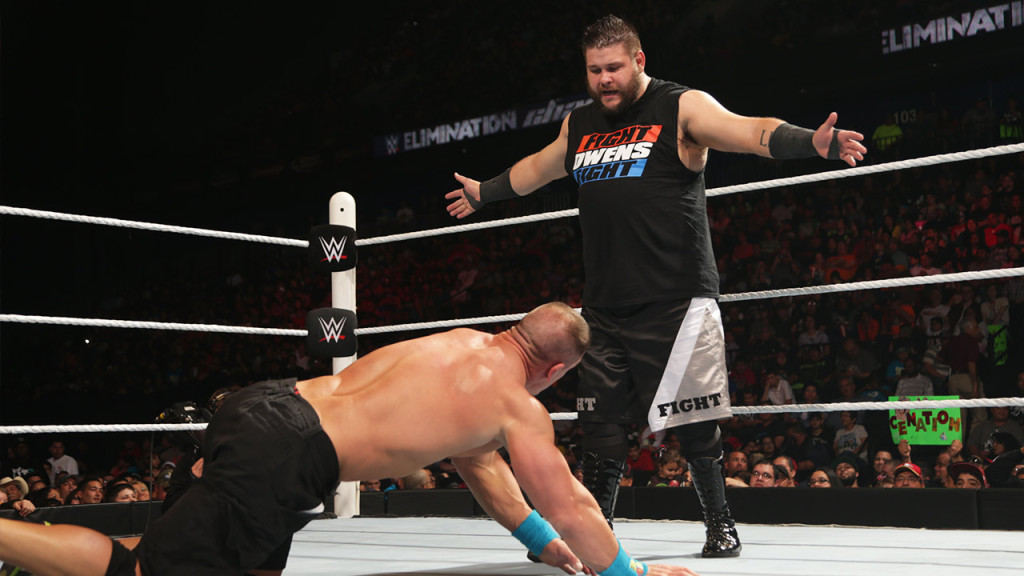
Naturally, he lost clean to Cena by tapping out in the middle of the ring. This was just the latest in a long line of instances where Vince McMahon – at least over the past few years – shucked away from creating a new main event star in order to retreat to the comfort of a guy who was made ten years ago. It doesn’t always go the same way, sometimes Vince just kills a guy’s push with no real Plan B. I’m sure it’s not all Vince’s doing (you can get a better idea of the sort of “yes men” he surrounds himself with by googling the name Kevin Dunn). The bottom line is that Vince McMahon is, for some mysterious reason, terrified of taking chances on creating new main event stars.
I’m not going to go into how creating new stars back in the Attitude Era led to the most successful period in WWE history – that’s a whole other article. The fact was that Vince was forced to make new main eventers because WCW had signed away all of his current main eventers. The sad truth is that there’s no outside parties pushing Vince any longer, and so he doesn’t feel he needs to create new superstars. Even though, by that same token, there’s no real risk in pushing new guys to the top because WWE is really the only show in town. Thriving profressional wrestling organizations in Japan and Mexico are fine, but they’re not really competition. The same could be said for TNA and ROH who, even after recently pairing up, are still not a genuine threat.
Even with some bright spots popping up here and there, WWE has a very stale product. A big part of the problem is Vince McMahon & Co keeping fresh faces away from the top of their cards, and regularly digging up stars from past eras to take those spots. In this blog, I’m going to explain several instances where they could have gone in exciting new directions before copping out and returning things to the status quo.
I’m only going to go back to 2011, since four years really is a large enough sample size to make my case. Throughout the summer, CM Punk was cutting blistering promos and having exceptional matches. He impressed so much that Vince decided to put the WWE Championship on him at the Money on the Bank PPV that July. After getting one of the loudest pops in recent history for beating John Cena, Punk was written off TV to build up anticipation for the rematch at SummerSlam.
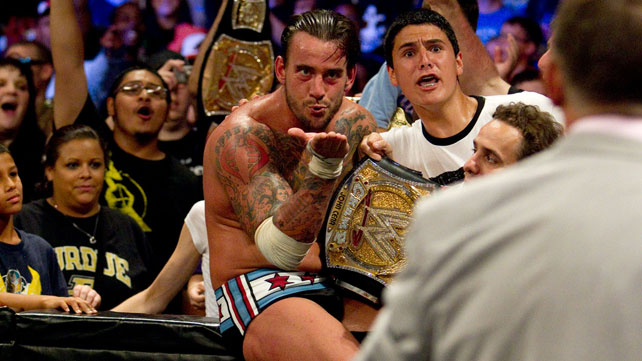
The crowd is hot for Punk all the way up to SummerSlam, and he won that match as well. Of course the end of the match was a bit overbooked, which took some of the wind from it. Not nearly as much, though, as having a has-been who played a very large part in the death of WCW – Kevin Nash – come to the ring, drop Punk and allow lukewarm heel Alberto Del Rio to cash in a Money in the Bank contract to take the title off Punk. Punk then proceeded to have a pointless, several month long feud with Triple H before the powers that be finally realized that Del Rio wasn’t doing anything for the fans and put the title back on Punk at Survivor Series in November 2011.
CM Punk went on to have the longest WWE reign as WWE champion in 25 years and had a series of great matches. He may not have main evented as much as he should have during that reign, but things worked out at least. Dolph Ziggler was not as lucky.
Ziggler is a great worked who, at the time, was a heel who got more cheers than most of the babyfaces that WWE wanted the people to actually cheer for. He won the Money in the Bank contract in 2012, but still was booked to lose a lot more matches than he won – which is really how his career has gone for the most part. On the night after WrestleMania in 2013, Ziggler finally cashed in his contract and won the World Heavyweight Championship from Alberto Del Rio. Del Rio was a lukewarm babyface at the time, and the pop Ziggler got when he won rivaled the massive one that Punk got the year before.
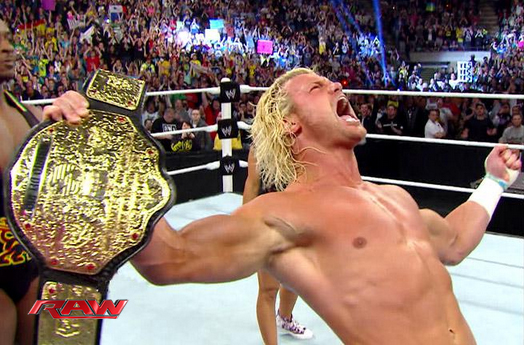
Unfortunately, Ziggler got a concussion off a blown spot and ended up having to sit out for a few weeks. This did nothing to dim his popularity and, when he came back to finally defend his title, WWE decided to make him a full-on babyface. He then proceeded to lose the title back to Del Rio, much to the dismay of everyone other than Vince McMahon. Championships are won and lost all the time, and so the fan naturally figured they would put the title back on Ziggler in short time. But it was not to be. Del Rio held onto the title until October 2013, where he dropped it at Hell In The Cell to Vince’s safety blanket John Cena.
Ziggler continues to be a great worker, in fact he had an awesome moment at Survivor Series 2014 where he was the sole survivor in a match that ousted mega heel group The Authority from power. In an act of atrocious and lazy booking, The Authority was back in power less than a month later. Ziggler, meanwhile, was finally booked so badly for so long that the fans seems to have finally accepted that he’ll never be the main eventer that he should have been.
The arc of Daniel Bryan’s odyssey started in summer of 2013, when he split from a wildly popular tag team with Kane to become the single most over performer in WWE. His unmatched work rate, easy charisma and everyman sensibilities made him the most universally cheered WWE superstar since Stone Cold Steve Austin’s heyday. Bryan was essentially the only guy who every demographic in the crowd were rooting for. Vince and his henchmen are known for going all starry-eyed a very specific type of musclebound human action figure, and so he was not apt to move the undersized Bryan to the top of the card.
But every crowd in every city WWE went to had a different idea, and so Bryan finally got a main event WWE Championship match against (you guessed it ) John Cena. Bryan won the match, and the title, clean in the middle of the ring. This is all the more astounding since Cena only does one or two clean jobs every calendar year. After a few minutes of celebration, Triple H, the special guest referee in the match, dropped Bryan and allowed Randy Orton to cash in a contract to take the title off Bryan.
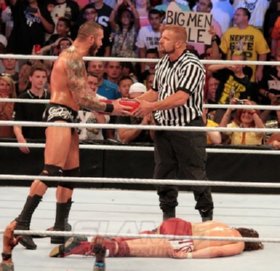
The next few months went much the same as they had for Ziggler earlier in the year. Bryan never won the title back, and was phased out of the title scene by the end of the year. Randy Orton squared off with John Cena to unify the titles- which was another terrible idea that I’ll have to address in another blog – and the world yawned. The fans, however, would not let Bryan suffer the same fate as Ziggler, and they simply cheered louder and louder for him no matter who he was in the ring with or if he was even in the ring at all.
It took all of Vince’s WrestleMania plans to fall apart – formerly popular superstar Batista came back and got booed out of the building, followed by CM Punk getting sick of the sort of things listed above and simply quitting the company – in order for Vince’s hand to be forced and allow Daniel Bryan to be the star of 2014’s WrestleMania. Bryan became the undisputed champion after a pair of great matches on the same night, and everything seemed right in the world of wrestling.
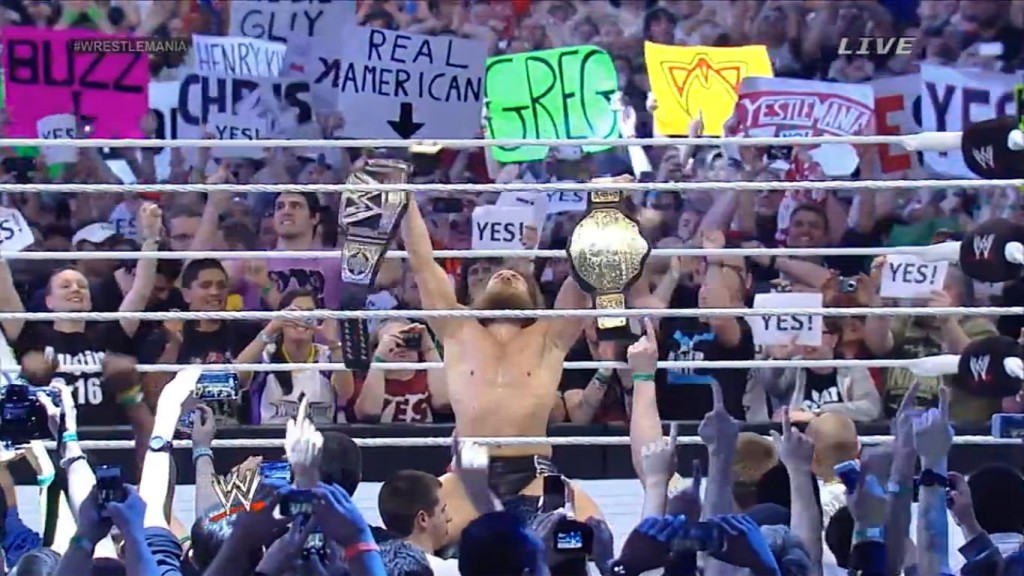
Sadly, a serious neck injury forced Bryan to vacate the championship, and the fans never truly got to see him have the title reign they were dying for. Of course, had they put the title back on Bryan back in September or October of 2013 like they should have, then we would have had a very satisfactory seven month title reign filled with a number of guaranteed great matches.
After Bryan vacated, Vince could have put the title on another up and coming superstar in an eight man ladder match held in June 2014, but boringly and lazily plopped it back on Cena. It’s worth noting that two guys who I’ll get to in a moment – Bray Wyatt and Cesaro – were also in this ladder match. Cena was then used to put the WWE Championship on part-time bad ass Brock Lesnar.
It may sound like I’m piling on John Cena here, but I’m really not. He’s a fine worker and, after all, he’s not the one booking his programs. That being said, he’s been used over the past year to bury a trio of heels who could have been used to freshen up the man event picture – Bray Wyatt, Rusev and Kevin Owens.
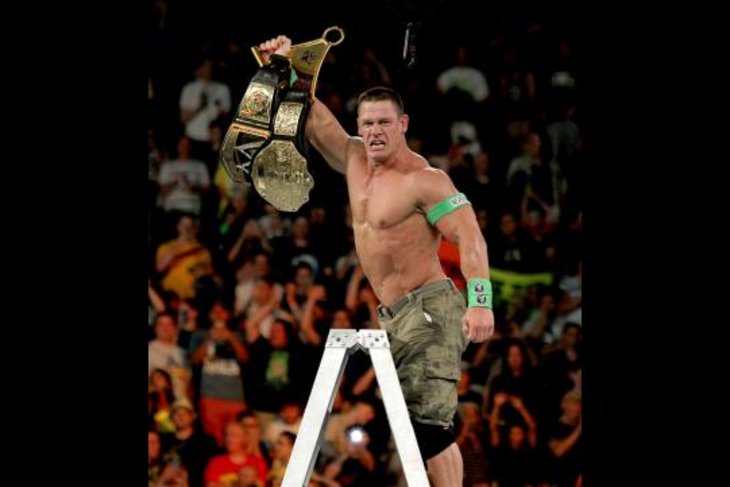
To summarize, a win for Wyatt over Cena at WrestleMania 2014 would have established him as a made man. Naturally he lost in the center of the ring. Wyatt hasn’t even sniffed the main event scene since then. At WrestleMania 2015, Rusev was the undefeated United States Champion who would have gotten a similarly massive boost by beating Cena. So, he also lost in the middle of the ring, and has become a bit of a comedic act since then.
Cena has since brought a lot of credibility and excitement to the US Title picture with his weekly US Title Open Challenges on Raw. But the truth was that he should have just been holding the title until the right time and right guy came along to take it from him. Kevin Owens was that right guy, and this past Sunday at the Battleground PPV was the right time. So, of course, John Cena was booked to beat him in the middle of the ring. Now, this just happened, so it’s not too late for things to work out. But it seems pretty unlikely, and the optimal moment for Owens to win the title has passed.
As I type this, Cesaro is on a run of fantastic matches that rivals Daniel Bryan’s leading up to SummerSlam. His popularity is blowing up, and the fans are ready to see him take the leap into the main event scene. Years of sour experiences have given me very little faith in ever seeing him reach the top of the card, though I’d love to be proven wrong. That being said, there’s no legitimate reason for him not to. Then again, Vince McMahon & Co have never seemed to need legitimate reasons to do any of the stupid things they do.
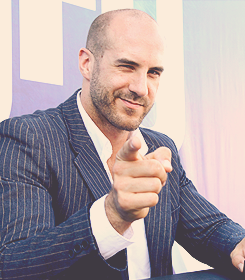
CM Punk, Dolph Ziggler, Daniel Bryan, Bray Wyatt, Kevin Owens and Cesaro are all guy who could have – or still can – make the WWE main event scene a lot more entertaining. Yet Vince McMahon prefers to dwell in his John Cena-shaped cave. When he does venture out, he brings along part timers like The Undertaker, Brock Lesnar or The Rock, and sticks them at the top of the card until they go away again a month later.
It’s a bummer, but it’s not too late. Punk is gone, Bryan may be finished and Ziggler’s cred may be damaged to the point where he’ll never get his WWE Championship reign. But Wyatt, Owens and Cesaro are still in spots where they can succeed if they’re given the opportunities that Vince gave to John Cena a decade ago.
But Vince is scared of the future, and he’s scared of taking risks even though there’s no genuine risk involved. As I mentioned earlier, there’s no real competition for WWE’s market share. The best hope we, as fans, have is for Vince to finally step down and let Triple H and Stephanie McMahon take over, as they have shown a very promising vision of the future with NXT. Barring that, maybe John Cena will decide that making his living in Hollywood is a better deal than getting bounced off a ring apron every night. I’ve heard only good things about his roles in Trainwreck and Sisters.
Anyway, that’s my diatribe. I’ve been a fan of WWF/WWE for way too long to pull myself away – even though I do fast forward through about 65% of Monday Night Raw on a given week. Still, I’d like to see new stars being made, and new match-ups at the top of the PPV cards.
The most exciting part of pro wrestling, after all, is the fact that it’s a “sport” where the fans actually have an influence on how things play out. Or at least they should. We can’t hit three pointers for our favorite NBA teams, and we won’t catch touchdown passes from the QB of our favorite NFL teams. No matter how loudly you cheer for your team, it’s not really going to affect the outcome of the game. But with pro wrestling, you buy a ticket and you cheer as loud as you can for your favorite performers. The powers that be hear those cheers and sometimes, though less soften than they should, they will give those stars a well-deserved push.
TV shows have production schedules that stop them from changing course on a dime if something is not working. On the other hand, if something is not working on WWE TV, they can flip that story around the very next night. But too frequently they do not. I’ll keep watching, regardless, and I’m sure I’ll keep complaining. Hopefully, though, there are enough of those CM Punk/Dolph Ziggler/Daniel Bryan pops to keep me from becoming disenchanted enough to finally cancel that WWE Network subscription.
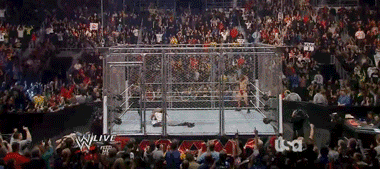
Ah, who am I kidding. There’s always that back catalog to keep me on-board. Ironically enough, that might be the exact same stance that Vince McMahon has been taking.







